Treks to Machu Picchu vary in difficulty and length, but all require a basic level of fitness.
In this Training for Machu Picchu article, I will outline the four things you can do to be perfectly prepared for your trek.
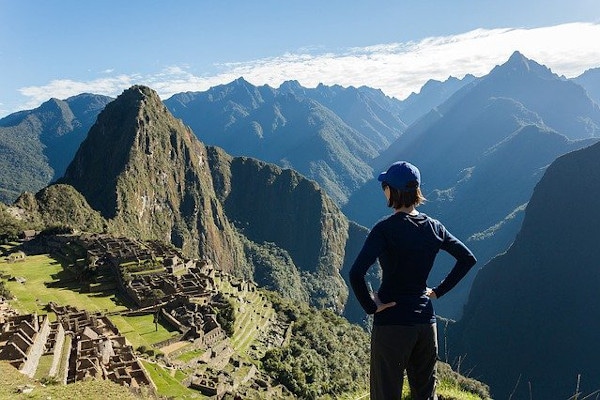
Get a Machu Picchu trek quote
Start planning your Machu Picchu hiking holiday.
Training for Machu Picchu
Depending on which route you choose to Machu Picchu, you will be trekking anywhere between 10-15km (6-9 miles) a day for up to six days on the longer routes (i.e. Choquequirao or Salkantay / Inca Trail Combo).
On the 4D/3N Inca trail, you will average 12km (7 miles) a day, and will need the endurance to trek over 4,000m (13,123 ft) passes where the altitude makes the going tough, and Inca stone stairs take a battering on your legs.
That's why you'll need four specific types of training to best prepare for Machu Picchu:
- Aerobic Training
- Leg and Upper Body Training
- Practice Hiking
- Mental Preparation
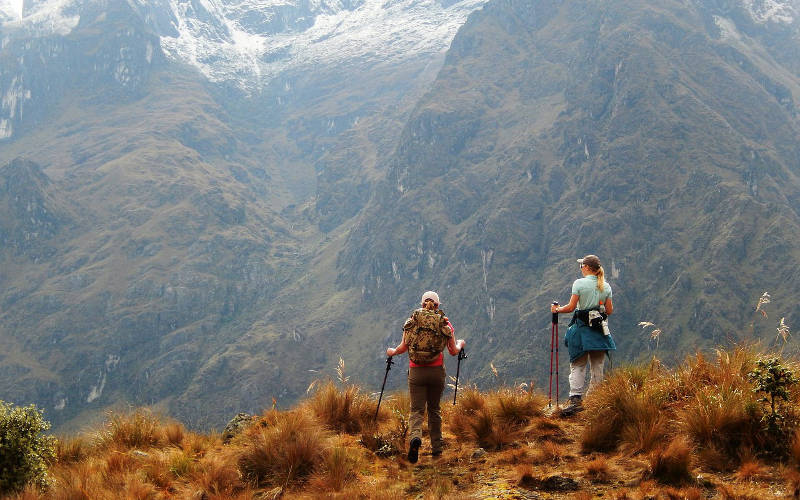
Aerobic Training
Aerobic training, or cardiovascular training, refers to activities that use oxygen to adequately meet the demands of exercise through aerobic metabolism, and should be the focus of your training programme for Machu Picchu.
The types of aerobic exercises include light-to-moderate intensity activities like:
- long-distance running
- swimming
- cycling
- brisk long-distance walking
These activities are key for treks to Machu Picchu, as a strong cardiovascular system is much better at processing oxygen.
Aerobic activities differ from anaerobic training that focus on high-intensity exercises like heavy weightlifting and sprinting.
High-intensity training uses anaerobic metabolism (without oxygen) to supplement the energy demands on the aerobic system, and only puts strain on the cardiovascular system.
In terms of an aerobic training programme, I recommend keeping it simple. If you are relatively unfit, it's better to start a training regime 3-6 months before your trek where you focus on one or two cardiovascular exercises like running or swimming.
The intensity of your workout should be light-to-moderate, but the duration should be relatively prolonged.
For example, if you choose to focus on jogging, then you should aim to run 3-4 times a week, covering 5km-10km (3-6 miles) at a time. The intensity should be consistent so that you feel like you have had a proper workout, but you should not be completely out of breath.
If you find you are out of breath, you are pushing yourself too hard. Should that happen, reduce distance and intensity until you get to a comfortable pace and slowly build up your endurance.
For really fit individuals, I recommend you just maintain your training regime. One month before your trek, you can increase the duration of your exercise but not the intensity.
Please Note: There is a flip side to having a strong cardiovascular system. The fitter you are, the harder you can push yourself on your Machu Picchu trek. This is a mistake as exertion at a high altitude is a key driver of altitude sickness. Make sure you go slowly on your trek, particularly on the ascents up and over passes. Breathe deep into your lungs and do not over exert yourself.
If you want your strong cardiovascular system to support you at a higher altitude, you do not want to overstrain it.
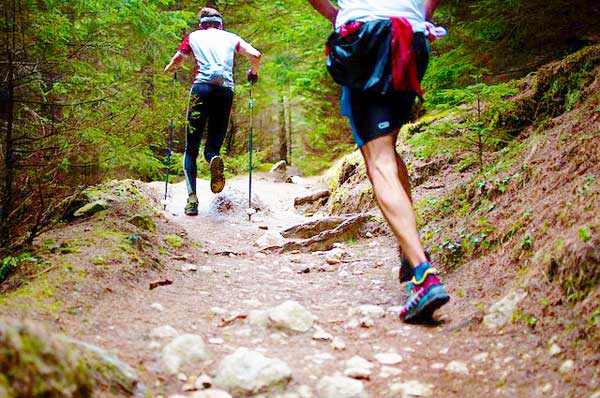
Leg and Upper Body Training
Along with aerobic exercises, it is important to do strength training for your legs and upper body. In terms of legs, I suggest you focus on these four exercises:
- Lunges
- Lightweight squats
- Lying leg curls
- Step aerobics – this is particularly helpful for the Inca Trail that consists of 1,000s of steps!
With regards to your upper body, you should focus on strengthening your core (stomach and back muscles) and your shoulders.
You are not trying to get ripped muscle, but build strength. This is important as you will be carrying a pack throughout the trek, so you will need the upper body strength.
Here are a few light to mid weight exercises to focus on:
- Sit-ups
- Kettle-bell rows and swings
- Shoulder presses
- Back and shoulder flies
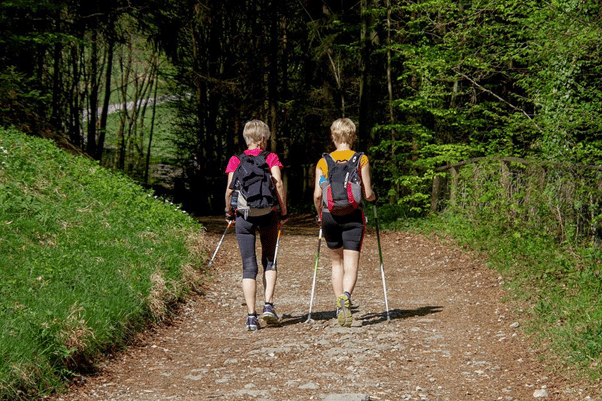
Practice Hiking
Hiking is a unique activity that is difficult to train for properly if you don’t do any practice hikes beforehand.
A long walk along a beach or a river path is very different to high altitude trekking that traverses big passes and rocky terrain which constantly undulates.
I recommend doing at least two long-distance (10km / 6 miles) mountain hikes in your home country before you undertake a Machu Picchu trek.
On these practice hikes, you will want to find terrain that is rocky and undulates. You will also want to carry a light pack while hiking.
If you are planning to do an unsupported trek, I recommend you do a number of backcountry camping excursions and carry all your gear, including a tent, sleeping bag and food. This will give you a good sense of what to expect in Peru as well as help in breaking in your Inca trail hiking boots.
You may also like: How hike the Salkantay solo and unguided and can you hike the Inca Trail without a guide.
Please Note: Breaking in hiking boots before a trek is very important. Do not arrive in Cusco with brand new boots. You will undoubtedly get sore feet, blisters and potentially lost nails if you don't break them in first.
Your feet are what gets you to Machu Picchu, so make sure your boots are good quality and well broken in. See our Inca trail packing list for advice.
Top Tip: If you have long toe-nails, make sure you cut them as far back as you can. This will help prevent bruising, painful toes and lost toe-nails while wearing hiking boots.
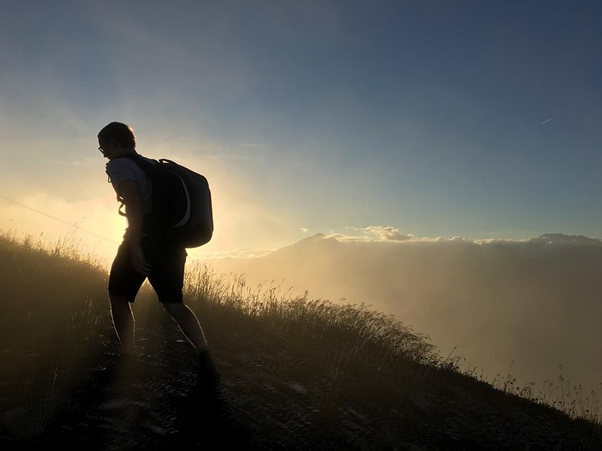
Mental Preparation
Training for Machu Picchu is as much about your physical endurance as it is about your mental stamina.
There will be points where the trek is particularly tough, usually on the trails up to high passes. Despite tired legs and sore bodies, you will need to be able to dig deep to push yourself up and over passes.
Make sure you have a good attitude before arriving in Cusco. That means preparing yourself mentally for a proper challenge.
If you have never pushed your body hard before, try doing an organised fun run (i.e. half marathon) or competitive triathlon in your home country before you arrive in Peru. This will give you a sense of pushing your body really hard in an activity that has a definite end.

Get a Machu Picchu trek quote
Start planning your Machu Picchu hiking holiday.
Conclusion
Treks to Machu Picchu are not extremely tough, and in fact, most people of various ages and fitness levels can complete them. But, if you are someone who is concerned about your ability to complete the trek, then working on your mental stamina, whilst improving your physical endurance, will make all the difference.
Focus on these four Machu Picchu training activities and you will no doubt have an incredible time trekking to one of the world’s most impressive and mysterious archeological sites.

Hi, 36f, I'm very overweight (250lbs) and very active. Powerlifting primarily. I also swim, kayak, and bike. I'm not particularly fast but I have decent endurance and would prioritize improving endurance as I got closer. I also hike but usually around 10k and never more than 1k elevation. Distance wise I think it would be fine for me, I can get there. Is there anything specific I could work on to help for the elevation? Losing weight would be great but unfortunately probably won't happen (just realistic). I'd like to go next autumn.
Hi Carla, it’s very hard to prepare for the altitude without actually going to altitude. I thiink if you’re fit and active, you will be just fine on the hike. The Inca trail has a section with lots of steps so that can take it’s toll on your knees. Worth wearing knee supports if you have bad knees.
Helpful article. I'm going on the Inca trail this December. It's my first time doing something like this. I'm training right now (mostly gym work for the past month), but I will add running in a bit. I'm a little bit nervous. Will the remaining two months be enough time to train? Also, concerned with the altitude sickness. How many days in Cusco is ideal? F52
Is it safe for me to go to Machu Picchu? I will be 17 weeks pregnamt at the time. I am worried anout the altitude.
Hi Kathy, unfortunately I’m not qualified to answer this question. I recommend talking to your physician or GP.
I am so eager to take this off my bucket list! any help you can provide will be appreciated
Hi Mark- Do any of the tour companies have tours specifically for seniors. I’m in my early 60’s and in good shape. Right now I’m looking at a woman’s tour, unfortunately, most are in their 40’s.. and they carry their own backpacks.
Hi Patti, I’m not familiar with any companies that offer woman’s only tours, but perhaps worth trying one of these operators -> https://www.machupicchutrek.net/inca-trail-tours/
I will be 70 next year and want to do the Machu Picchu trail. I believe I’m relatively fit for my age – can swim over 1km freestyle without stopping in around 24 minutes (not over pushing myself) walk several times a week, between 8-16 Kms each time. I climbed Adams Peak in Sri Lanka 3 years ago which is considered pretty tough and I did find it so. Actually, coming down worse as my knees were very painful. So I’m wondering if I am being unrealistic in thinking I should be able to do this. My son did it aged 18 and he’s super fit but says he thinks I’ll be fine. But what do you think?
Hi Anna, quite a few people in their 70s hike to Machu Picchu, either on the Inca trail or alternative trails. The Inca trail is particularly tough on the knees as there are lots of steps. I would say all treks are relatively challenging, but if you’re in good health and comfortable walking for 10-15km over undulating mountain trails for 3-4 days, then you can definitely do it. Hope this helps!
Hi Mark, we are 8 seniors in the bracket of 65-75 yo having intention to visit Machu Pichu next year in Sp 2023; just wondering after we reach MP by train or by plane , how far is the distance to walk till we reach the plateau of the ruins in Machu Pichu ? is there any picture that we can see in order to have an idea how dificult is the area we have to walk.
Thanks
Budi Japadermawan
Hi Budi, you will reach Aguas Calientes by train and can then catch a bus up to the entrance of Machu Picchu. Once in the citadel there are quite a few steps to go up and down, so you might want to take a flatter route. But in general, if your party are okay with walking over cobbled stones and can handle steps, then there is not much to be worried about.
Thank You; lots to think about and very interesting
I have completed the short Inca trail a couple of years ago.. I took a car ride over to vilcabamba and would like to trek this trail to machu pichu not the classic Inca trail. It appears that the operator you contacted for me does not cover this trail. Do you know of any other operators who cover this trek
Hi Malcolm, thanks for getting in touch. I’ve completed the Vilcabamba, which is a great route but unfortunately, not many operators offer it. I used Kandoo Adventures, although they are quite pricey. All the best!
Hi Mark;
We are 4 women in our late 50's – averagely fit – have done a bit of hiking mainly in Arizona – the most strenuous being Camelback – which I found tough but doable. Would you say we should do the 2 day Inca hike instead of the 4 dayundefined3 night? A friend who is incredibly fit said she found the Inca Trail tough – which concerns me as she is super fit..
Hi Elle, thanks for getting in touch. The Inca Trail is pretty tough. Day two goes to high altitude (4,200m) so experiencing altitude sickness is possible. It also consists of lots of steps so can take its toll on the knees. That being said if you have an average level of fitness it is totally doable. Many people in there 50s, 60s and even 70s do it every year. But if you are concerned then I would recommend the 2-day hike, which is a lot easier. Feel free to contact me directly if you would like a quote to book: [email protected]. Thanks!
Hi Mark,
I am planning to be in M P in October 2020 and thinking of hiking the Inca trail . This year, 2019, I hiked (slowly) in the Rockies – Sentinel Pass, Parker Ridge, Cavell Meadows & Sulphur Skyline which are all classed as moderate but I found it pretty hard going. I will be 76 in 2020 , do you honestly thing I would be up to the Inca Trail.
Hi Kate, Thanks for getting in touch. I’m not very familiar with the hikes you mentioned in the Rockies. The Inca Trail is a fair challenge. The two things people generally struggle with is the high pass, called Dead Women’s pass, and the many steps on the trail. The latter does take its toll on the knees. If you are concerned about your ability to hike for 4-6 hours everyday, for 4 days, then you may want to consider the short 2-day Inca Trail. This is a lot shorter, and skips Dead Women’s Pass. Pretty much all operators offer the hike. It is permitted so you need to book with a registered outfitter. You can get connected with one here: https://www.machupicchutrek.net/go/
Thanks for the information for training. It was very helpful!
I am booked to hike the Inca trail in April 2010. I don’t like heights very much but have completed the Milford track, the Cape Brett track, and many of the other ” Great Walks” of New Zealand. Is that enough heights and length of hikes or do you think it will be too much for me.
I am a 59 year old female with good health and reasonable fitness.
Many Thanks
Breda
Hi Brenda, I think you will be absolutely fine. There is no serious height exposure on the Inca trail. The main concern for most people is the high pass (Dead Women’s Pass), which is 4,200m. You may experience some altitude sickness here but if you have spent a few days pre acclimatising in Cuzco you should be absolutely fine. All the best for your hike!
Hi there! So I’ve had a lot going on personally and haven’t trained enough. I’m going to Machu Picchu with my job and now only have 3 weeks left to get some training in. Should I focus on jogging? What can I do this late in the game to get somewhat ready?
Hi Monique, Yes, I would focus on aerobic exercises like joking, cross trainer, rowing or cycling. If you can get one or two day hikes in that would help too. All the best!
Thank-you for the article it is exactly what I was looking for!